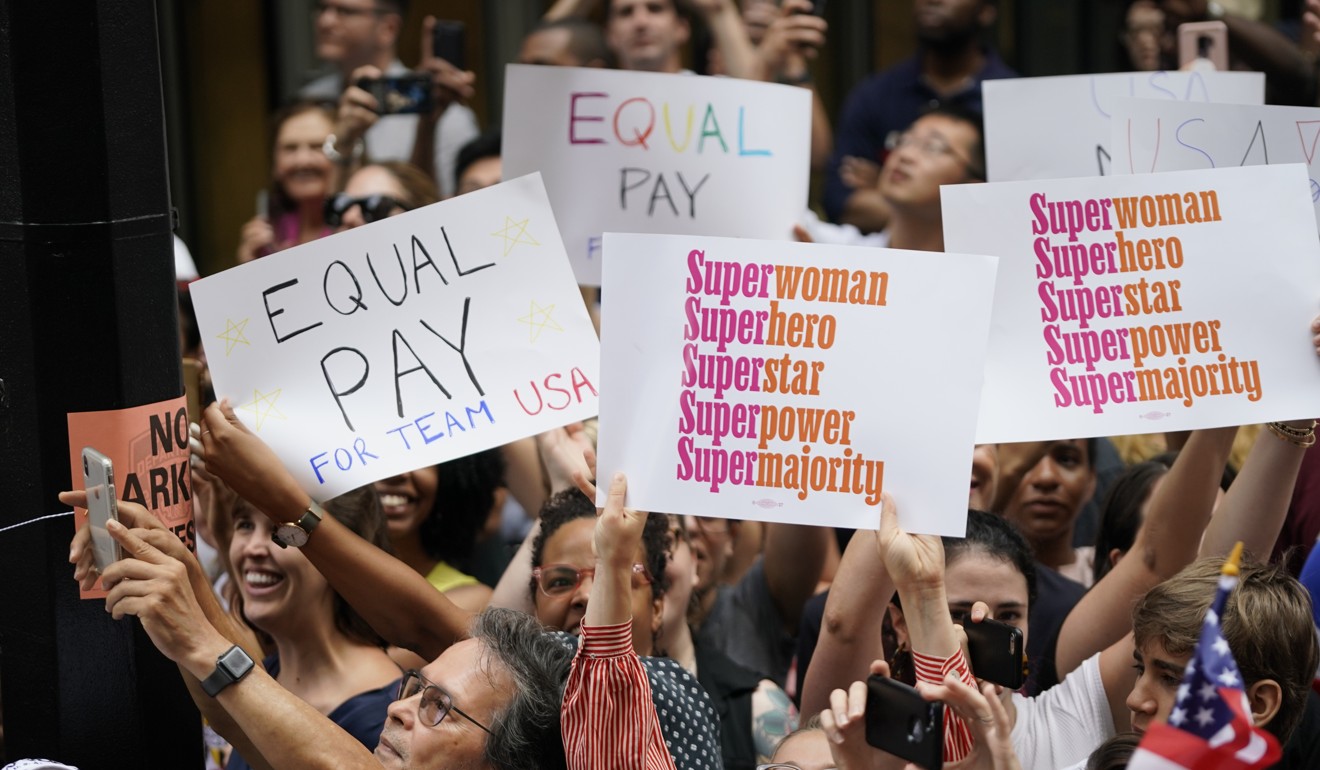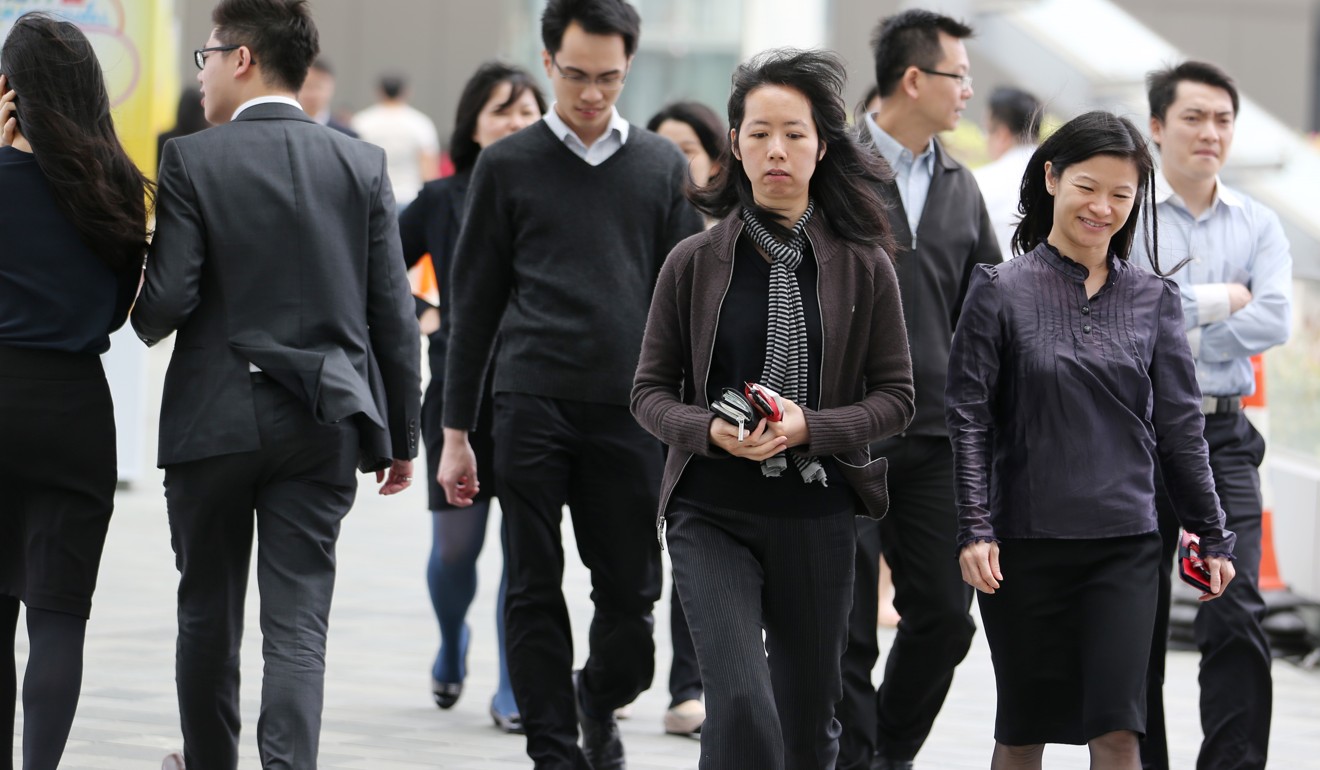
Equal pay is a vital issue for all, not just soccer players at the Women’s World Cup
- Equal treatment, support and respect are essential for women to become successful, and society should step up to ensure they get it
- Hong Kong in particular is a major culprit in allowing pay gap between men and women to widen as each get older
The statistics are fairly stark when it comes to the gender pay gap. Some commonly cited data indicates that women make 80 per cent of what men earn, while other figures put it at as little as half.
Although gender pay inequality is a perennial topic that has generated much discussion, and many industries have done their part to improve the situation, one sector that stands out in this debate is the realm of professional sport.
Nilla Fischer, a Swedish female international soccer player, made a shocking assessment in a recent interview: “What they [male soccer players] possibly make in an hour, I make in a year.”
According to a 2018 Sporting Intelligence Salary Survey, the English Premier League’s male soccer players are paid more than 100 times what their counterparts in the women’s game earn. Male soccer players in the Premier League earn £3 million (US$3.8 million) a year on average.

This year, the issue was highlighted during the Fifa Women’s World Cup, which was recently held in France. The US women’s national team, which would go on to win the tournament, had set the tone, filing a lawsuit in March against the US Soccer Federation.
How Chinese women ‘hold up half the sky’ but earn far less than men
Their complaints outlined in the lawsuit covered various aspects of their working conditions besides wages, ranging from the quality of medical treatment to travel arrangements as compared to their US male counterparts, who didn’t even qualify for the 2018 World Cup.
The fight against what American female players call “institutional gender discrimination” has not been without its difficulties since the 1990s. But the unprecedented worldwide media attention the latest Women’s World Cup drew has given the issue more prominence, as have recent campaigns for gender equality and women’s empowerment.

There are those who argue that women should wait to achieve comparable success before fighting to be paid the same wages as men, but I beg to differ.
It is difficult to become successful without proper support, equal treatment and respect. This means being given proper financial incentives, not less than what the opposite sex gets.
Opinion: Hong Kong needs to talk about the gender pay gap, not just who wears the trousers or apron
Female players can only become better and play on a bigger scale, attract more fans, and become more popular if given the same support, the same visibility, exposure, and so on.
And fighting for gender equality goes beyond sport. Women deserve equal pay and equal treatment in whatever role they play in life.

In Hong Kong, we don’t even have a prominent platform like the World Cup to highlight the issue. The city appears to be one of the worst culprits when it comes to gender pay differences.
According to the latest report by Prospect and PublicAffairsAsia, entry level staff aged 20 to 24 in the communications and corporate affairs sector earn roughly the same, regardless of gender – about US$30,000 (HK$23,470) per year. But by the ages of 25 to 34, men begin to out-earn women by 8.3 per cent on average, and some studies show the pay gap gets worse with age.
Is gender pay inequality a problem in Hong Kong?
Fighting for gender equality is not just a responsibility for all, but a reality.
The more support and attention we get the easier the battle becomes. Getting equal pay is not just about money. It is about effecting a sea change in attitudes and raising awareness as well as respect.
We need to educate our next generation and let our children know that they are all getting the same opportunity in life and that includes giving girls the same opportunity to dream.

We must challenge the gender inequities that run deep in our society. If generations of women remain complacent, and grudgingly enter the workforce expecting lower pay than their male counterparts, then this injustice will continue.
People will continue to make poor excuses to justify lower wages, such as childbirth and familial obligations, but this has long since become a dated concept.
‘Discrimination’ in Hong Kong sees pay divide between men and women widen
Some countries like Sweden offer extended paternity leave, as their workplaces operate with the belief that women should have the choice of returning to work, and that it is a regressive notion to assume that only women can care for their children. Some families don’t even have female carers, so why assume that it is automatically a woman’s job to raise children?

There are naysayers who will continue to believe that women are only fit to bear children, that some women do not deserve to be paid as much as men, or who bandy about words like “hysterical” when women protest against such prejudice.
Whatever obstacles that come our way, we must keep fighting the good fight to ensure that justice is done.
Women will be paid the same as men … in about 200 years
If these detractors throw statistics at us to prove their point, let us counteract their argument with better ones. If they continue to say that women are only good for giving birth to and rearing children, point them in the direction of successful women who dominate the workplace and have families at the same time.
It is not an easy fight, but fundamental rights are never easy to obtain; and you cannot put a price on fairness.
Luisa Tam is a correspondent at the Post

